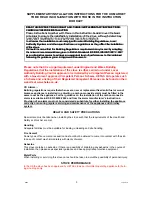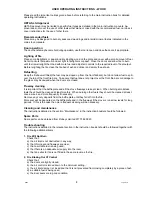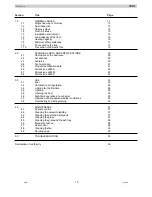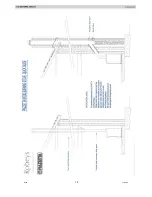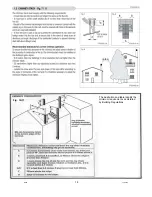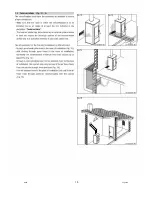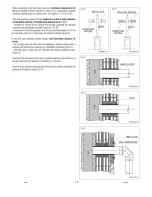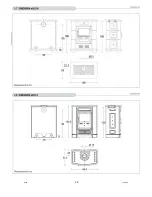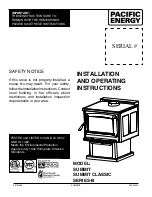
E903
7
July 2012
nace or from any fixed boiler if located in a designated smoke control area. It is also an offence to
acquire an "unauthorised fuel" for use within a smoke control area unless it is used in an "exempt"
appliance ("exempted" from the controls which generally apply in the smoke control area).
The Secretary of State for Environment, Food and Rural Affairs has powers under the Act to author-
ise smokeless fuels or exempt appliances for use in smoke control areas in England. In Scotland
and Wales this power rests with Ministers in the devolved administrations for those countries.
Separate legislation, the Clean Air (Northern Ireland) Order 1981, applies in Northern Ireland.
Therefore it is a requirement that fuels burnt or obtained for use in smoke control areas have been
"authorised" in Regulations and that appliances used to burn solid fuel in those areas (other than
"authorised" fuels) have been exempted by an Order made and signed by the Secretary of State or
Minister in the devolved administrations.
Further information on requirements of the Clean Air Act can be found at:
http://smokecontrol.defra.gov.uk/
Your local authority is responsible for implementing the Clean Air Act 1993 including designation and
supervision of smoke control areas and you can contact them for details of Clean Air Act
requirements.
Fuel overloading:
The maximum amount of fuel specified in this manual should not be exceeded, overloading can
cause excess smoke.
Operation with door left open:
Operation with the door open can cause excess smoke. The appliance must not be operated with the
appliance door left open except as directed in the instructions.
Dampers left open:
Operation with the air controls or dampers open can cause excess smoke. The appliance must not
be operated with air controls or dampers left open except as directed in the instructions.
Periods of Prolonged Non-Use
If the stove is to be left unused for a prolonged period of time then it should be given a thorough
clean to remove ash and unburned fuel residues. To enable a good flow of air through the appliance
to reduce condensation and subsequent damage, leave the air controls fully open.
Extractor fan
There must not be an extractor fan fitted in the same room as the stove as this can cause the stove
to emit smoke and fumes into the room.
Aerosol sprays
Do not use an aerosol spray on or near the stove when it is alight.
Use of operating tools
Always use the operating tools provided when handling parts likely to be hot when the stove is in
use.
Chimney Fires
If the chimney is thoroughly and regularly swept, chimney fires should not occur. However, if a
chimney fire does occur turn off the stove immediately and isolate the mains electricity supply (if
applicable), and tightly close the doors of the stove. This should cause the chimney fire to go out. If
the chimney fire does not go out when the above action is taken then the fire brigade should be
called immediately. Do not relight the stove until the chimney and flueways have been cleaned and
examined by a professional.
Permanent air vent
The stove requires a permanent and adequate air supply in order for it to operate safely and
efficiently.
In accordance with current Building Regulations the installer may have fitted a permanent air supply
vent into the room in which the stove is installed to provide combustion air. This air vent should not
under any circumstances be shut off or sealed.
Summary of Contents for E903
Page 2: ...E903 2 July 2012...
Page 9: ...E903 9 July 2012...
Page 11: ...E903 11 July 2012 N O T F O R U K U S E...
Page 12: ...E903 12 July 2012...
Page 13: ...E903 13 July 2012...
Page 15: ...E903 15 July 2012...
Page 16: ...E903 16 July 2012...
Page 18: ...E903 18 July 2012...
Page 19: ...E903 19 July 2012 N O T F O R U K U S E...
Page 20: ...E903 20 July 2012...
Page 21: ...E903 21 July 2012...
Page 22: ...E903 22 July 2012...
Page 23: ...E903 23 July 2012...
Page 24: ...E903 24 July 2012...
Page 25: ...E903 25 July 2012...
Page 26: ...E903 26 July 2012...
Page 27: ...E903 27 July 2012...
Page 28: ...E903 28 July 2012...
Page 29: ...E903 29 July 2012...
Page 30: ...E903 30 July 2012...
Page 31: ...E903 31 July 2012...
Page 32: ...E903 32 July 2012...



